|
A cargo ship comes thundering towards New York harbour, which flying cop Mac claims is "against every rule in the book." Really? What, all of them? When he can't see anyone on deck he assumes that the crew have been stricken down with something horribly contagious. Bit of a stretch but it turns out he may be right. When the ship docks, a small group comprised of NYPD Lieutenant Tony Arras (Marino Masé), a doctor from the Health Department and three disposable lackeys board it wearing sloppily sealed white contamination suits. They soon discover the bodies of the crew members, which appear to have exploded from the inside. OK, I'm not sure how you explode from the outside (or implode, as we like to call it), but you get my drift – stomachs ripped open and intestines splattered all over the shop. Horrible mess. It's then that they find a toppled box that has spilled its contents onto the floor, contents that initially look like sickly coloured melons. Oh wait a minute, could they be eggs? And there are an awful lot of those boxes here. They then discover that one of these eggs has fallen between two hot pipes and is glowing and emitting a rhythmic groan. "Don't touch it!" barks the only intelligent one in the room, but that doesn't stop one of the lackeys from picking it up in ultra slow motion. No surprise, then, when it explodes in his face, spraying him and the Doc with an acidic goo that causes the insides of both men to make an explosive bid for freedom.
Arras subsequently finds himself in a hexagon-plastered military facility run by Colonel Stella Holmes (Louise Marleau). Holmes is one of those female officers you only find in 80s science fiction films, women with boutique hair and no sense of humour who blabber generic nonsense like "Put emergency plan number seven into effect" and "Call in the Special Section: Squad Two". Turns out it was she who decided that a British astronaut named Hubbard was bonkers when he returned from a mission to Mars claiming he'd seen loads of big green eggs on the planet's surface, eggs the Colonel now has all over her silly judgemental face. As you can imagine, Hubbard is not exactly over the moon when she shows up on his doorstep asking for his help, but soon he, she, and the persistently unwitty Arras have teamed up to track down just where the rest of these lethal eggs are being stored.
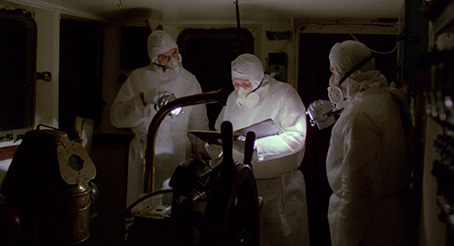
Contamination was part of a cycle of low-budget Italian genre movies made in the 70s and 80s to cash in on notable American genre successes. The key inspiration here was Alien, or so we are assured, but while the opening torchlight shipboard search, the throbbing alien eggs, the Martian cave flashback and the exploding human innards have their origins in Ridley Scott's space-bound horror masterpiece, Contamination then goes its own dotty way with the rest. Which is actually a bit of a shame, as instead of scaring us with biological horror it pushes its luck with unlikely twists involving ESP and a mesmerising carnivorous Cyclops monster.
Not being a scientist, I have to admit to being a little confused by what these alien organisms are actually trying to achieve. In Alien the purpose of the extraterrestrial eggs soon became clear, to lay their young in a nice warm host, from which their nasty little progeny would burst and quickly grow to kick the cycle off all over again. In Contamination the eggs explode, showering anyone within pissing distance with a liquid that effectively tears them apart. And then what happens? No creature emerges from the resulting goo, and if the alien is biological in form, as we are led to believe it is, then its first post-birth act is to destroy any nearby potential hosts, in the process preventing them from transmitting the infection to other potential victims. No wonder they need so many damned eggs. One for every two people on earth by my calculation.
Of course, piling on the perils, however ludicrous, is par for the low budget, cash-in horror course, and on that score Contamination delivers the exploitation goods. Intermittently it does better than that. The opening torchlight ship search is atmospherically handled, and while the raid on a warehouse full of eggs being guarded by a trio of trance-like goons cements the influence of Phil Kaufman's Invasion of the Body Snatchers, it's still a creepy sequence with a suitably dark conclusion. Best of all is the scene in which Colonel Holmes finds herself locked in a hotel bathroom with an egg that is throbbing loudly enough to indicate an imminent burst. Director Luigi Cozzi (here masquerading as Lewis Coates, presumably to fool the American public into thinking that this was a home grown product) does a spanking job of cranking up the tension by repeatedly cross-cutting to the unaware Arras and Hubbard, whose ambling indecision and lack of urgency provide the film with its most effective wind-up.
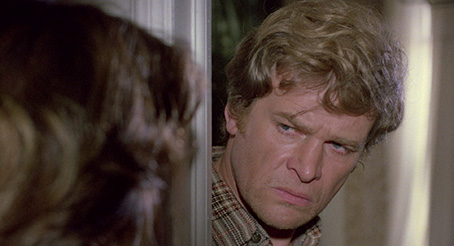
The actors are sometimes at the mercy of the post-dubbing that was standard practice on Italian films of years past, whatever their status. Having said that, the very British Ian McCulloch apparently redubbed himself on the English language track, so has only himself to blame for that anguished bellow of "HAMILTON!" during the Mars mission flashback. That aside he's rather good, and is certainly more engaging than the uptight Holmes or the would-be comical Arras.
The score by Italian horror favourites Goblin – or 'The Goblin' as they are credited here – is one that reminds you less of their astonishing work on Argento's Suspiria than their status as one of the country's most popular purveyors of prog rock, a musical form whose interminable guitar and keyboard solos still give me the heebie-jeebies. Pitched somewhere between annoying and oddly catchy, it certainly has its enthusiastic fans, and Fangoria editor Chris Alexander (see the commentary on this very disc) regards it as the band's finest film score. What, seriously? I remain unconvinced, though will admit that it did grow on me with subsequent viewings. And yes, I did end up watching the film a number of times, irresistibly drawn back to a genre piece that although made on the cheap, was nonetheless as much the product of energy and enthusiasm as the desire to make a quick buck.
In the end Contamination (and no, there is no contamination in the film – the extras explain all) is a typically daft but engaging low budget Italian 80s cash-in genre piece, one almost designed to get serious-minded cineastes looking down their noses and exploitation junkies giggling with delight. And daffy though it may be, that damned Cyclops is just the sort of monster I spent countless hours of my misspent childhood drawing and secretly hoping, in my dark and twisted way, that I would one day find waiting for me behind a door I'd been told expressly never to open.
Quickly made, low-budget Italian horror movies shouldn't theoretically look as good as this, but that's what you get when you shoot on 35mm film. A crisply detailed and largely clean 1.85:1 transfer (a small number of dust spots do remain) that is at its best when the sun is up or the room lights are all on, but still holds its own in the darker scenes. The contrast delivers good black levels without obliterating shadow detail and looks great out of doors, and the colour reproduction is solid, if a little earthy in the dimmer interior scenes. The gooey effects are rendered in loving detail.
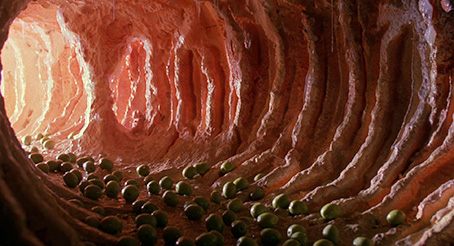
You can choose between English or Italian Linear PCM mono 2.0, and since they are both dubbed, each is technically as authentic as the other. Both are a tad range restricted on the dialogue, but the music fares rather well, which is good news for you Goblin devotees. The English dialogue is louder, but also tends to sound more like a dub than the Italian track, where the dialogue has been better mixed to sound as if it was recorded on location.
Optional English subtitles have been provided if you want to watch the film with the Italian track. There is also an English subtitle track for the deaf and hard of hearing, which mirrors the English language track.
Luigi Cozzi on Contamination (22:55)
In an archive interview, director Luigi Cozzi establishes his genre fan boy credentials at the start by tapping away at his typewriter wearing a gas mask and monster hand gloves. As he talks about the various influences on the film and the process of bringing it to the screen, shots of the science fiction imagery that adorns the walls of his home give way to some not very informative behind-the-scenes footage. Still of interest as a whole, however.
Contamination Q&A (41:05)
Filmed at the Abertoir Horror Festival at the Aberystwyth Arts Centre in November 2014, this post-screening Q&A with director Luigi Cozzi and leading man Ian McCulloch proves both entertaining and revealing. McCulloch in particular is amusingly forthright, claiming that he initially found the whole thing a little ridiculous and admitting that he took the job primarily for the money and the chance to work in interesting locations. He also tells a rather funny story about confronting a burglar in his hotel room, though I can't be the only one who did a do-me-a-favour double-take when he claims he only recently learned that Survivors – the excellent post-apocalyptic 70s BBC series in which he starred – is classified as science fiction. Cozzi also has plenty of interesting tales about the production, remains bemused by the film's inclusion on the video nasties list (as do we all, frankly), and explains how it ended up with a title that bore no relation to what actually happens in the film. There is also a strong suggestion that the film was partly funded by money from Columbian drug cartels.
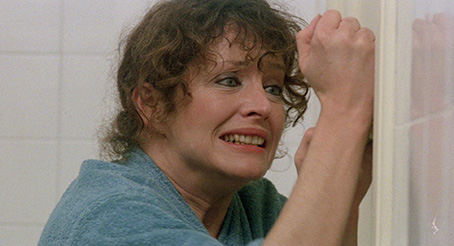
Sound of the Cyclops (11:31)
Goblin keyboardist Maurizio Guarini talks about joining the band, leaving it after a falling out during the recording of Suspiria and being invited to join again when two of the others departed. Unfortunately he has no strong memories of doing the Contamination score other than that it didn't take long to do and was one of several films the band was scoring at that time. I was oddly thrilled to discover that he still has the keyboard he used back then, a big early Yamaha synth that you programmed by twiddling a series of small knobs.
Luigi Cozzi vs. Lewis Coates (42:53)
In a newly shot piece, director Cozzi talks straight to camera, and thus directly to his audience, about his career and his lifelong passion for science fiction cinema. Cozzi could talk for Italy in the verbal Olympics, but this is fully justified by the story he tells – this man really has had a fascinating career, with a self-published genre fanzine of his youth leading to writing and later directing work, which he continues to this day whilst also running Dario Argento's Profondo Rosso shop in Rome. This is a compelling and richly detailed piece, the only small blip being a soundtrack that boasts a tad more reverb than you'd expect and is underscored by what sounds almost like the amplified clicking of a hard drive and at one point some unidentified person moving loudly around the room. Live with it – the content is too good to seriously gripe.
Imitation is the Sincerest Form of Flattery (17:26)
Maitland McDonagh, author of Broken Mirrors, Broken Minds, and Temple of Schlock's Chris Poggiali talk about Italian cinema's fondness for churning out cheap and cheerful knock-offs of big Hollywood and occasionally even Italian hits, usually at a speed that leaves Hollywood movies standing. An enjoyable and detailed introduction to what almost constitutes an exploitation sub-genre, peppered with extracts. Made me want to see blatant Jaws rip-off Great White, the producers of which were successfully sued by Universal for copyright infringement.
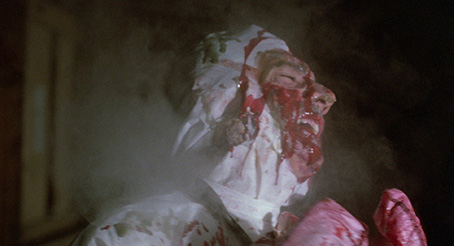
Original Theatrical Trailer (3:14)
A blend of action, violence and portentous lines of dialogue that disguises its spoilers by cutting away at the key moment.
Graphic Novel
The graphic novel based on the Contamination screenplay, drawn in a clean and unfussy style by Sergio Muratori. You advance the pages manually using your remote, and the bigger your TV, the clearer the images will be. The exploding bodies are brilliant.
Commentary with Chris Alexander
The current editor of Fangoria magazine and a serious enthusiast for Contamination, Alexander provides a richly entertaining commentary on the film, its production, its cast, its director and a whole lot more. As I mentioned above, he's a big fan of the score, and champions just about all aspects of the film, though freely admits that the plotting rarely makes any sense and is not above shouting this at the screen when the characters fail to react in a logical manner. It matters not, he assures us, because "realism is for the bourgeois." Hugely enjoyable and informative to boot.
Booklet
If commentaries aren't you're thing (get out!) then the essay on the film by Chris Alexander that dominates this booklet proves a worthwhile substitute, covering similar ground but with more precision. Credits for the film and notes on the restoration are also included, plus some really big colour stills.
Narratively silly but still a good deal of fun, Contamination is a film that will likely have those who like their science fiction polished, intellectual and free of obvious borrowings shaking their heads in disbelief. For the rest of us, Arrow have once again delivered the goods, treating the film with the sort of loving respect that lesser labels would reserve for more obvious prestige titles. Lovely stuff. Fans of this distinctive brand of Italian exploitation cinema (you know who you are) should rush out and buy it.
|